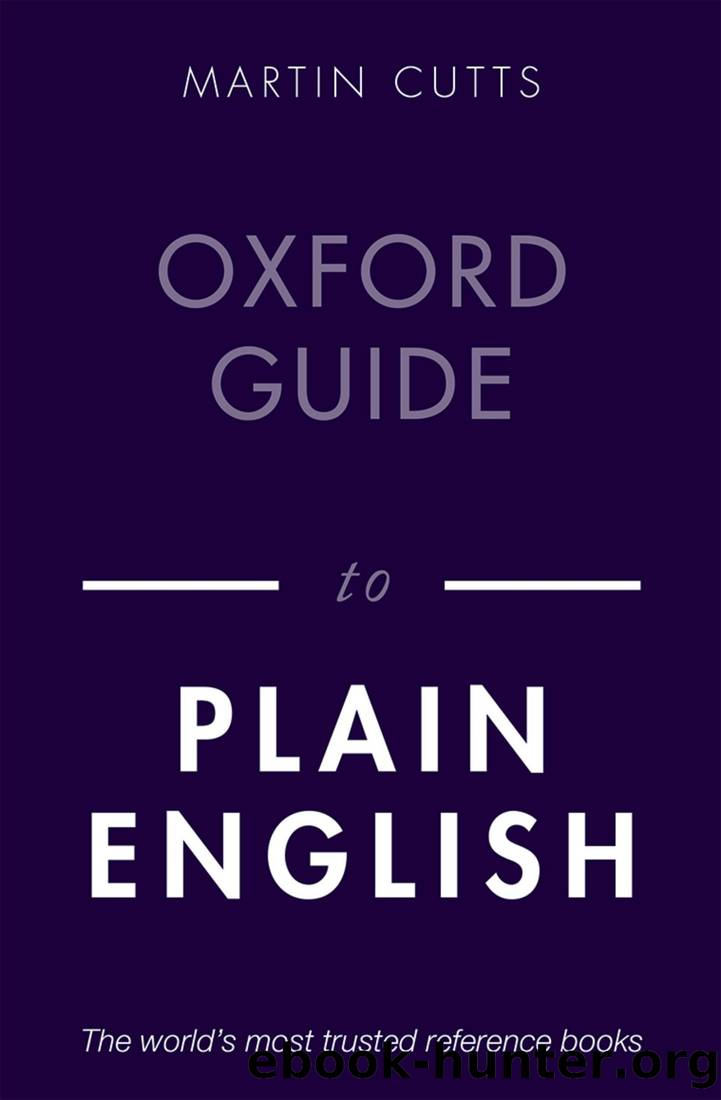Oxford Guide to Plain English: How English Conversation Works by Martin Cutts

Author:Martin Cutts [Crystal, David]
Language: eng
Format: epub
ISBN: 9780192583086
Publisher: OxfordUP
Published: 2020-02-03T00:00:00+00:00
English is a greedy and mongrel language enriched for centuries by hundreds of direct borrowings like caravan, trek, graffiti, bastard, clan, crag, criterion, phenomenon, slogan, corgi, garage, and armada, and thousands of foreign-derived words such as plant, fantasy, custom, interest, jury, mutton, bungalow, and tea. The larger dictionaries show the foreign roots of many of our words, with perhaps 70 per cent having Latin or Greek ancestry. Plenty of them are easy and widely understoodâtheyâre part of the plain-English lexicon.
A few terms have kept some of their strangeness but are surely plain English now. In this group are vice versa, which saves several words of explanation (though the other way round may sometimes do), per cent, and etc. Curriculum vitae seems likely to endure as CVâthe best alternative in American English is the French résumé, while in South East Asia the pleasing biodata is widespread and New Zealanders tend towards merely bio. The term ad hoc usefully fills a niche in phrases like ad hoc group, and nothing else says it betterâbut if it were tested among the population, I doubt it would be widely understood.
Terms like e.g., i.e., per annum, per capita, and per diem still cause confusion for a mass audience. Certainly, i.e. and e.g. are concise but fewer people can now distinguish between them because schools rarely teach Latinâso the English equivalents are safer. Times have certainly changed since 1939, when Mind the Stop, a book on punctuation by G V Carey, began:
In writing this book I have had more especially in mind three classes of readers: those who, professionally or otherwise, are faced with the task of reading proofs; those who at school are learning to write English correctly (and perhaps a few of their teachers, quorum pars parva fui); and those ordinary folkâI have met plentyâwho remark somewhat vaguely âI know nothing about punctuation.â
Most authors today would give a translation of the Latin phraseâit means of which I was once one. In 1999, the BBC dropped its award-winning science series QED because few viewers understood the title or its scientific connection. The BBCâs head of science told the Daily Record: âItâs not surprising that the audience didnât have the faintest idea what it meant.â The series was reborn as Living Proof, though its disappearance soon after suggests that the obscure title may not have been its only shortcoming.
Uncommon foreign-language terms wonât be well understood, so unless youâre sure of your audience, itâs best to avoid those words and phrases often seen in the literary-review pages like oeuvre, homage, Bildungsroman, noir, fin de siècle, grandes horizontales, femme fatale, and auteur. The news pages of popular dailies will rarely use such terms as casus belli, modus operandi, and glasnost because they will not be understood. Words of foreign origin relating to dress, decoration or religious practice such as hijab, jilbab, burka, niqab, patka, bindi, kohl, kippah, yarmulke, kosher, shalwar kameez, halal, and haram are slowly becoming better understood in the wider UK population. In essential information, though, foreign-language terms are best omitted, or explained in words or pictures.
Download
This site does not store any files on its server. We only index and link to content provided by other sites. Please contact the content providers to delete copyright contents if any and email us, we'll remove relevant links or contents immediately.
In The Mind Of A Maintenance Man by Keith Turner(118)
IB English A: Language and Literature by Rob Allison Brian Chanen(109)
Suena 1 by Libro del Alumno(92)
Genealogy Online for Dummies by Unknown(91)
Phonology in the Twentieth Century: Second edition, revised and expanded by Stephen R. Anderson(85)
Native American Genealogical Sourcebook by Paula K. Byers(75)
Evaluation of ion uptake isotherms and analysis of individual fluxes of ions by Unknown(75)
The effect of ultra-violet radiation on crossing-over, and on wing development in <Emphasis Type="Italic">Drosophila melanogaster <Emphasis> by Unknown(75)
A Concise Dictionary of Indian Philosophy Sanskrit Terms Defined in English by John Grimes(74)
Evaluation of thiol-based antioxidant therapeutics in cystic fibrosis sputum: Focus on myeloperoxidase by unknow(73)
Cooling conditions of the reactor of the Beloyarsk nuclear power station first unit during shutdown of the station and depressurization of the evaporative circuit by Unknown(66)
Physical map and gene localization on sunflower ( <Emphasis Type="Italic">Helianthus annuus <Emphasis>) chloroplast DNA: evidence for an inversion of a 23.5-kbp segment in the large single copy region by Unknown(50)
